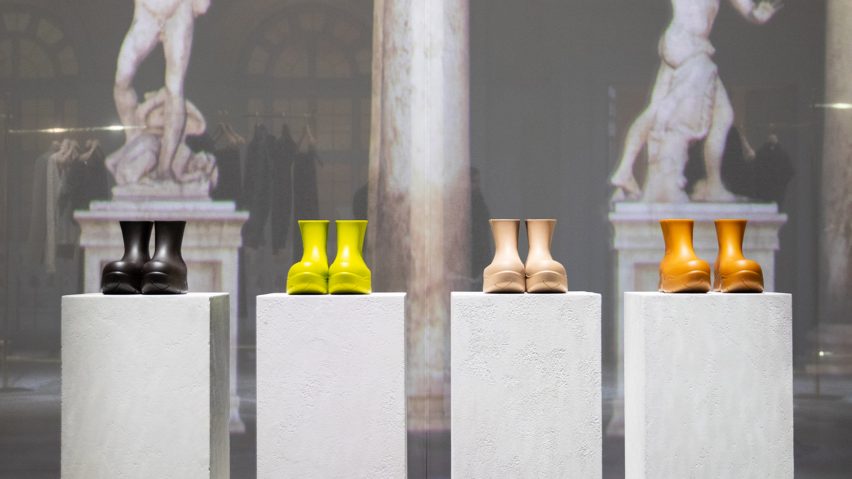Italian fashion house Bottega Veneta sent models down the catwalk in footwear made of sugarcane and coffee that the brand claims are fully biodegradable.
The chunky boots, a hybrid of clogs and wellies, were sported by both male and female models during the brand's Autumn Winter 2020 show at Milan Fashion Week.
"The rubber is made with natural molecules including ones derived from sugarcane and coffee, rather than with synthetic chemicals," the brand told Dezeen.
"That means they will biodegrade within a year once placed underground, or in a controlled environment under specific lighting and humidity conditions alongside the presence of microorganisms."
After becoming the first luxury brand to receive a LEED certificate for its headquarters, this is the latest move towards sustainability for Bottega Veneta, which has long been synonymous with leather goods.
Luxury brands from Gucci to Prada and Burberry have already gone animal-fur free, and attention has now shifted to leather, not just due to implications of animal cruelty but also because of the material's environmental impact.
Leather requires the mass rearing of livestock, which leads to greenhouse gas emissions, deforestation and the rapid consumption of finite natural resources. It also entails the chemical pollution created in the process of tanning and treating the leather.
The Kering group – the conglomerate behind Bottega Veneta as well as Gucci and Balenciaga – has already introduced metal-free tanning for around 24 per cent of its collections, to prevent the potential contamination of local water supplies.
This is part of a wider sustainability push, which saw the group announce last year that it would go fully carbon neutral. It pledged to reduce greenhouse gas emissions for all its associated fashion houses by 50 per cent by 2025, as well as offsetting all emissions by investing in forest and biodiversity conservation projects.
Although this latest collection under creative director Daniel Lee still features leather pieces, including Western boots and tasseled pouches in the brand's hallmark Intrecciato basketweave, this move into biodegradable, bioplastic footwear suggests that Bottega Veneta is at least starting to consider alternatives.
The boots avoid the pitfalls of many synthetic fur and leather substitutes – which are made with fossil fuel derivatives like polyurethane and PVC. But an ongoing debate rages within the design community about whether bioplastics derived from materials such as sugarcane are actually the more sustainable option.
These foodstuffs largely need to be shipped in from overseas at great carbon expense, while also diverting increasingly sparse resources from human consumption.
Elsewhere, Stella McCartney champions sustainable fashion design, teaming up with Adidas to create a cruelty-free version of the brand's classic Stan Smith trainer as well as a biodegradable tennis dress made from artificial spider silk.
Outside of the high end market, young designers have tried to tackle the fashion industry's sizeable environmental footprint by making compostable T-shirts from algae and wood pulp and outerwear that is filled with wildflowers rather than goose down or its synthetic alternatives.
Photography is courtesy of Bottega Veneta unless otherwise stated.

